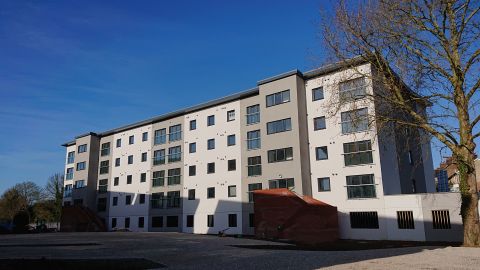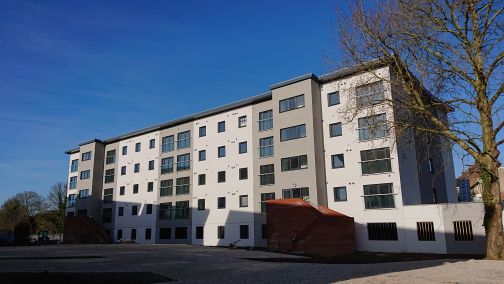
How does combining HVAC technologies maximise development ROI and help improve the energy efficiency of developments?

Although it seems that this leaves a relatively short period of time to adjust to the new standards, the technology to help with the transformation of these buildings already exists. A highly energy efficient, fully electric system that utilises in-apartment hot water heat pumps and direct acting panel heaters has been specified in commercially successful developments. Among many others, the Flitch End development by Dimora Homes in Braintree, is a good example of how these new technologies work.
Flitch End Development, Braintree
The 48-apartment development by the family run Dimora Homes saw the installation of a low carbon fully electric heat pump solution based on the Edel Hot Water Heat Pump. The combination of compact, in-apartment hot water heat pumps and direct acting panel heaters helped overcome challenges with regional compliance. The direct cost of the solution, including installation, was approximately £50k less than the alternative that was originally considered, which used PV units to achieve compliance. To read more about this project, read our latest case study.
What is a hybrid, or a hot water heat pump system and how can it help increase the energy efficiency of new residential developments?
The term ‘hybrid system’ explains a solution which uses two or more different technologies, often defined by their fuel source, in a synergistic combination. A hybrid electric systems use a combination of electric technologies, including heat pumps, direct acting, and thermal storage technologies. This fully electric setup is ideal for specification in both new projects and retrofit where a fully electrified heat pump solution may not be financially or physically viable. An example of a cost-effective and highly efficient solution is a fully electric electric system based on the Edel Hot Water Heat Pump. This compact air source heat pump is integrated into a single unit with a hot water cylinder, and delivers the service with the highest energy demand, hot water, helping to reach renewable contribution targets with this load. This strategy can also reduce occupier energy consumption through its efficiency, recognised within SAP Appendix Q, of up to 336%.
High efficiency, high renewable contribution
The coefficient of performance (COP) for the Edel Hot Water Heat Pump is up to 3.36, which means it can supply up to 3.36kW of energy for every 1kW of energy it draws through the meter.
Edel Hot Water Heat Pump is listed in SAP Appendix Q and offers high renewables contribution in SAP. (switch these points as App. Q is a precursor to an approved COP)
The Edel Hot Water Heat Pump can be combined with a gas boiler or other technologies and affords complete flexibility of emitter specification. A fully electrified solution can be achieved when combined with direct acting panel heaters, allowing for a 100% energy efficiency at the point of use. Integration with high heat retention storage heating can help maximise the use of off-peak electricity tariffs, delivering low cost, on-demand heat for the occupiers. For buildings with low air-permeability, mechanical ventilation with heat recovery (MVHR) is an energy efficient solution that combines extraction of stale air and supply of heated fresh air using energy that would otherwise be lost to the external environment, further improving the energy efficiency of the dwelling.
Specification of the most effective solution will be guided by individual project requirements and consulting the HVAC specialist on a broad range of potential solutions from the concept stage is imperative. Now that we have considered how hybrid electric technology works, we should have a look at how the choice of an HVAC system may impact the ROI of a project.
What are the commercial considerations when implementing hybrid electric technology into new residential development
Rarely are two development projects the same. The approach will vary for new development and retrofit, for an apartment building or residential housing development, for a rental and for property developed for sale. There are many other project specific variables such as location, regional planning requirements, consumer demand and many others. Sadly, there is no single formula that can deliver maximum ROI. However, understanding the main benefits of specifying hybrid electric technology can help inform the choice of the right HVAC solution for a specific project.
- Low capital cost
The low capital cost of the Edel Hot Water Heat Pump, and the panel heaters it is often paired with, can be a decisive factor for any project where an initial outlay reduction can be pivotal.
- Compliance
Hybrid electric solutions based on the Edel Hot Water Heat Pump help meet on-site renewable and regional requirements, expediting and simplifying the project planning stage.
- Specification flexibility
The flexibility of application with other systems and emitters gives the designer more freedom to achieve various project objectives.
- Ease of installation
The technology does not require specialist installation, reducing skilled labour costs on site. This also means projects can be delivered at speed, allowing for quicker investment return.
- Energy efficiency
High energy efficiency is not only a matter of compliance, but also a particularly desirable feature for buyers are renters alike.
- Maximising footprint
The compact size of the solution, with an integrated cylinder unit, means it can be installed in service cupboards or utility rooms, maximising the footprint of the building.
- Maintenance and warranty
The Edel Hot Water Heat Pump comes with a five-year warranty. Building owners can benefit from remote control functionality, with the option to set up, manage and maintain the functioning of the system.
- Creating occupier desirability
The design of the Edel Hot Water Heat Pump ensures quiet operation. The solution is RF enabled and can be integrated with smart controls. Wireless control is becoming a much-demanded feature on the modern housing market that often commands a premium.
How does an electrified solution benefit my development?
The Edel Hot Water Heat Pump combined with direct acting panel heaters can offer a complaint and energy efficient solution that helps to design gas connections out of a development. This helps to futureproof the building, reduces the need for costly pipework and infrastructure, frees up usable space and can help with regional compliance
Hybrid electric solutions, based on the Edel Hot Water Heat Pump by Glen Dimplex Heating & Ventilation, have been specified and successfully installed in a wide variety of project across the UK. As a market leader in the development of electric HVAC solutions, we are well placed to advise on a solution to fit your development objectives. To find out about our range of options or to discuss the requirements of your next project, contact one of our HVAC experts.








